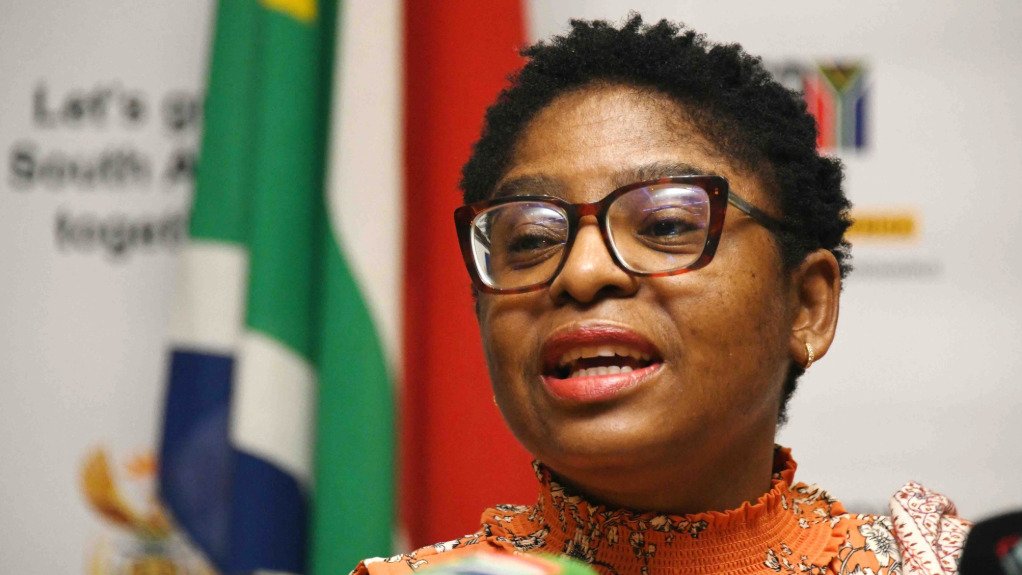Minister in the Presidency Khumbudzo Ntshavheni has reaffirmed that the coordination of State-owned enterprises (SOEs) previously falling under the Department of Public Enterprises (DPE), which is to be closed, will be located in the Presidency during the process of implementing a new shareholder model.
However, the precise roles and responsibilities that her fellow Minister in the Presidency Responsible for Planning, Monitoring and Evaluation, Maropene Ramokgopa, will have were still to be clarified in what she described as a “Presidential proclamation”, to be published in a future Government Gazette.
Speaking during a briefing on how the multi-party government of national unity (GNU) would function, Ntshavheni stressed that, until the Gazette was published, reports regarding Ministerial roles and responsibilities in respect of SoEs, as well as reporting lines for companies such as Eskom, Transnet and Denel, should be treated as speculation.
No timeframe was provided for the issuance of the Gazette notice, but it was possible that it might be released only after an upcoming Cabinet lekgotla, which had been scheduled for July 11 and 12.
Ntshavheni also refused to elaborate on the DPE closure process and the implications for staff, saying only that it would be conducted in line with national macro organisation of government (NMOG) processes, which are overseen by the Department of Public Service and Administration (DPSA) in the cases of a department’s restructuring or closure.
“But the issue of DPE closing is not a new issue. The staff of DPE knew, everybody knew that DPE was going to close and the NMOG process is not only commencing now, it had already commenced,” she said, indicating that the DPSA would clarify the position at a later stage.
She also stressed that the policies and programme of the GNU were still to be finalised and that the manifestoes of all 11 participating parties to the GNU were being analysed by the Forum of South Africa Directors-General to assess whether the policies outlined could feature in the seventh administration’s Medium-Term Strategic Framework (MTSF).
The analysis would be debated at the lekgotla, where the MTSF was to be agreed and President Cyril Ramaphosa would announce the details of the MTSF during his speech at the opening of Parliament on July 18.
GNU PROGRAMME TO BE FILTERED USING NDP
Party policies would be “filtered” using the vision and framework provided by the National Development Plan (NDP), against which their suitability for inclusion in the MTSF would be judged.
“After the adoption of the MTSF, the individual departments will then develop their strategic plans linked to the MTSF,” she explained, arguing that Ministers would, thus, be expected to implement the policies of the GNU as outlined in the MTSF rather than specific party-political policies.
Parliamentary committees would have oversight over the annual performance plans arising from the strategic plans and the National Treasury would fund the implementation of the MTSF through the National Budget.
“The Department of Planning, Monitoring and Evaluation is responsible for overseeing and reporting on the implementation of the MTSF and the annual performance plans and submits the reports of alignment and performance to both the President and the Cabinet.”
On whether a deadlock-breaking mechanism, which the GNU Statement of Intent said pertained where sufficient consensus could not be secured, had been created, Ntshaveni argued that existing Cabinet processes should be sufficient to break logjams.
She said that even when the Cabinet had been dominated by the African National Congress there were “vehement” differences of opinion.
“We differed vehemently, but a solution was found,” she said, indicating that, at times, matters were reverted to technical committees and interministerial structures before being deliberated upon again in Cabinet, where final decisions were made.
Ministers could also request direct access to Cabinet in those instances where ministerial committees could not reach agreement on a matter.
“So, we have not anticipated any deadlock because the mechanisms of resolving deadlocks are in place,” she said.
EMAIL THIS ARTICLE SAVE THIS ARTICLE ARTICLE ENQUIRY
To subscribe email subscriptions@creamermedia.co.za or click here
To advertise email advertising@creamermedia.co.za or click here











